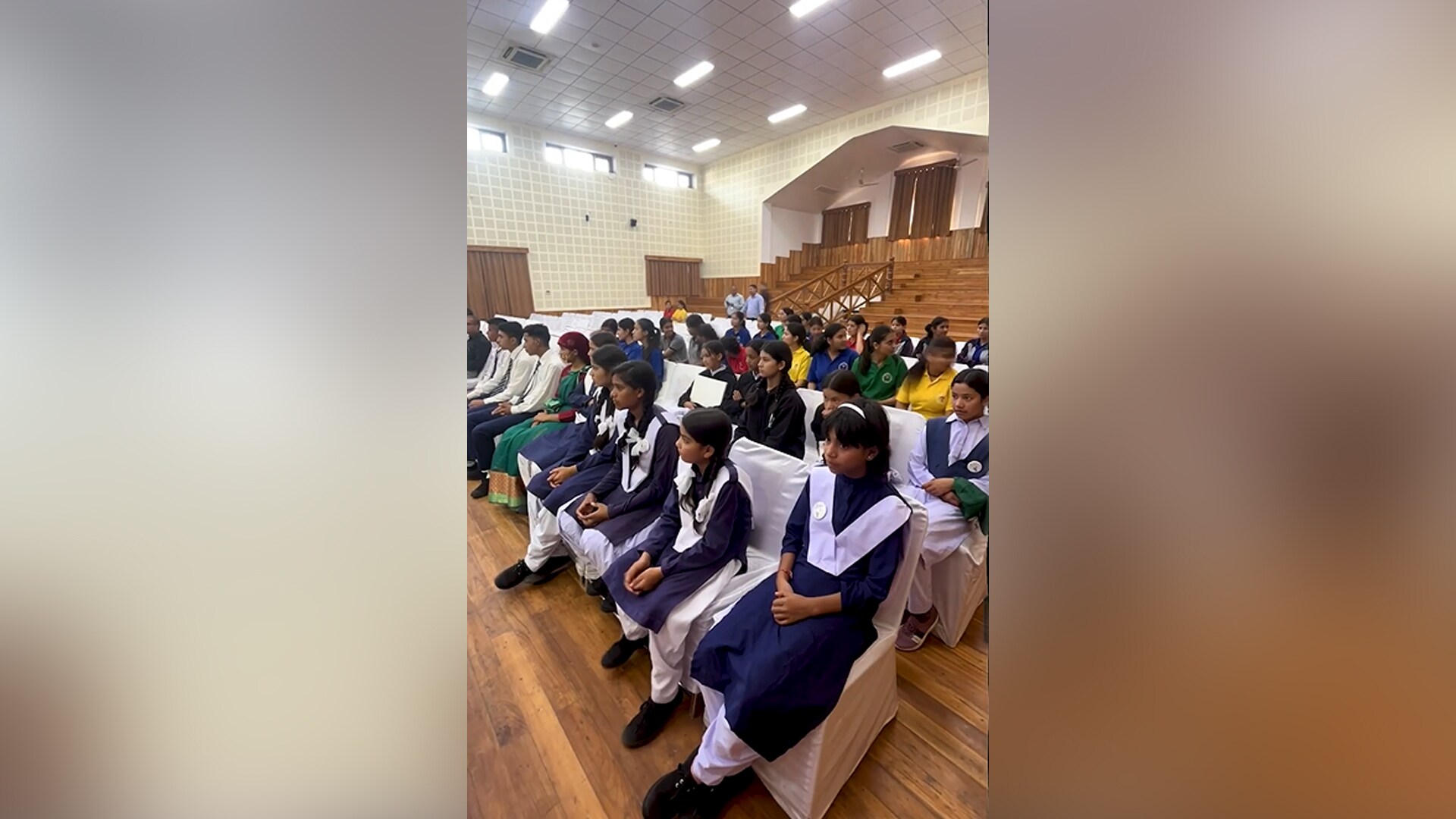

- Home/
- Top Stories/
- Growth of Philanthropy in India Impressive: Bill and Melinda Gates
Growth of Philanthropy in India Impressive: Bill and Melinda Gates
Bill Gates and Melinda French Gates, co-founders and co-chairs of Bill & Melinda Gates Foundation, spoke to NDTV's Dr Prannoy Roy on the sidelines of the annual World Economic Forum meet at Davos.
Here's an edited transcript of the interview:
Question (to Bill and Melinda Gates): Who's the boss here?
Answer (Bill Gates): We are pretty equal on the foundation work and we love talking to each other on areas of work and I still get more in depth, some of the science things I love to go to great depth. We have our strategy review coming up where we will sit with all the groups and both get a chance to give them feedback so we're running it together.
Melinda Gates: We are doing it all together.
Question: In your annual letter this year, you have said that in the next 15 years, the poor in the world will improve more than they have ever improved, and their lives will improve more than the lives of the rich. It is a huge statement. What's the basis of that very optimistic forecast?
Answer (Bill Gates): Yes, I had made that forecast both for the world and for India. India is a good example where there's an opportunity to get the new vaccines out and to really measure the performance of the health system and the education system and get a little bit of technology into the education system, get digital banking in... In fact, our big bet for this 15-year improvement will only come true if India leads the way and that's what we were really excited about. How the government is pushing some of these key issues... We are excited about the partnerships we have. We think we are both realistic and optimistic because we have seen pilot programs to trust that these things can really work.
Question: You know that's a big statement: 'It'll happen if India leads the way.' And you've just been to India a few months ago. You feel we can lead? We are been self-critical...
Answer (Melinda Gates): No. Absolutely first of all, if you look from the point of view of science and innovation alone, which I won't but just thinking of the Vaccine Company, what they are doing in vaccines and bring the prices down is just remarkable and when you say that India has 16 per cent of the maternal deaths in the world and a third of the children's deaths in the world, new born death, India is actually focusing at it, focusing on childhood deaths... What we are seeing with the governments of UP and Bihar and how they are partnering with Care and University of Manitoba to say these are the things that we need to teach women to do - immediate and exclusive breastfeeding. Those things are making a difference and it's what's going to bring down the death rate and not only focusing on under-five deaths but focusing now on newborn deaths with the newborn action plan. It's really remarkable.
Question: So you are optimistic about India?
Answer (Bill Gates): I think there is a paradox which is that when countries are most self-critical, it's often when they do their best work. In the US, as we got into the 1980s and 1990s, we were saying: 'Oh, Japan has low capital cost and they sing their company songs better than we do, the government coordinates the R&D better than we do.' We were feeling, 'Hey what's our model which was working very well. And it's more dynamic in fact some great things economically, technologically happen there, and it's great that the Indians are saying: 'Hey, the government needs to do its role. It needs to enable the private sector to do its role.' Then, although it's not as big as the other two, I think the growth of philanthropy in India is great. We just had lunch with a group of philanthropists, four of whom were leaders of the Indian philanthropy movement.
Question: Anil Agarwal mentioned that you have met him and convinced him that he should donate. And he was an eager recipient and he is donating lot of money?
Answer (Bill Gates): Yes, his energy on this has really impressed me. I went home that day and said that this is the first time someone has called me his guru and Melinda was very jealous but then after he met her...
Melinda Gates: No, I said that I don't think you should be someone's guru...
Bill Gates: ...but then he met her and said that she should be guru here so we are competing.
Question: In your annual report of 2015, you're targeting four areas - health, farming, digital banking and education. Here's a ridiculous question: (If) you have four billion dollars only, how much of that would you spend on each of these four areas?
Answer (Bill Gates): Well our money as compared to the budgets of any government - the United States or the Indian government - is very small but we have seen our ability to find scientific projects backing this virus vaccine. Now to actually roll it out, the health system is going to have to work out and most of the financing will be from the government. We've been very catalytic. I would still do vaccine research.
Question: You'd do catalytic philanthropy. And that's what you are propagating that everybody should do?
Answer (Bill Gates): And we have two advantages - one is our willingness to bet on science and the other is to sort of bring in management consulting point of view. We've been able to fund both at the state-level and the federal-level. Some really top notch consulting type thinkers who look at where the vaccine coverage is not good and they are called technical support units and they help the government use its resources in a smart way... So National Rural Health Mission was a lot of resources but hiring top notch people to say that this part is working and this part's not, we were able to be catalytic and help with that.
Question: But how would you actually allocate $4 billion just to categorise some order of significance?
Answer (Melinda Gates): Today we'd spend the majority of that money between those four categories, we'd say is in global health. We have been expanding in the other ones over time but the reason for that is that we think that health is a precursor to everything else in life. If you don't grow up healthy and you don't have proper nutrition then you can't get great education and participation in the economy. So the other thing that I would say about India is that, maybe again in your mode of being self-critical of yourselves, we see that this system, this platform that has been built out while still imperfect in places, you have this unbelievable platform to reach families all over the northern part of India and so one of the things we've been involved with is helping with that delivery platform and making sure that training happens. So we are seeing more services delivered and that's why we are so optimistic, that the newborn deaths and childhood deaths will come down.
Question: When you were in India, did you meet anybody that made you feel this is different?
Answer (Melinda Gates): Yes, I love to meet with families when I'm on the ground and I was out with ASHA workers just as a western woman... I met a young woman and she'd already had 4 children and with the help of the ASHA workers she learned about family planning tools and what she wanted to was use a family planning tool - a contraceptive - for the first time and she had to convince her husband. He wasn't initially in favor of that but then he said yes if we are going to educate our children have the money, I'll go with you to my parents to tell them this is the right thing to do and she said it took three conversations with her in-laws but they had decided as couple that for now, they are going to stress on having four children and maybe more later and she was so proud of what she learnt how she learnt to advocate for herself and what she thought was right for her children and so she inspires me when I go and talk about global health around the world.
Question: Cleaning our rivers and cleaning the Ganga can transform the lives in India, in terms of education and health. What's different about the Gates Foundation? Is that you do have a technology aspect to everything? Tell us about technology and change in health and education.
Answer (Melinda Gates): So Bill and I are huge believers in innovation and technology is one innovation that really starts change. In the sector of education what we are seeing today is having access to a great teacher is critically important and yet most students around the world don't have access to a good teacher. So we are looking at how you can have a great teacher supplemented with fantastic online tools because then you can personalise the learning so as those technologies come along then it will be a matter of how other governments and other private citizens going deploy them in their own country and that will be a lever of huge change in the education system. So no matter where you live even if you are in a remote rural area and you have a great teacher that takes you up to fourth grade then you still have access to great learning even beyond that.
Question: So you are wonderful leaders and you work far too hard. Which is harder: running an organisation or raising children?
Answer (Bill Gates): We are having fun with both maybe. It's going to get tougher but at our foundation, we've got a really good team.
Question: Software development and all this new technology. Will it create jobs or lose jobs in the long run?
Answer (Bill Gates): A huge amount of both, until we have all the old people being taken care of and with every student, with individual attention... There are labour needs that the world doesn't fulfill because labour is expensive now. We may have to retrain people, we may have to we may have to change tax systems, it's happening so fast that the governments will have to get involved in this but it will do a lot of both and there are people who have started worrying about that.
Melinda Gates: And I wouldn't say create jobs. Is that even the correct question? The question is: Will it empower women and are they going to be a lever in the economy as well?
Question: If the Prime Minister walks in now, what will you say to him?
Answer (Bill Gates): We would say: 'Hey, you are off to a good start. We want to help you. Let's get these bank accounts not only opened but used. (We) can we get them on the digital forum where the transaction fee will be lower. Let's get these toilets so that they are attractive and used. We want to pitch in in any way we can. Those are great goals.'












